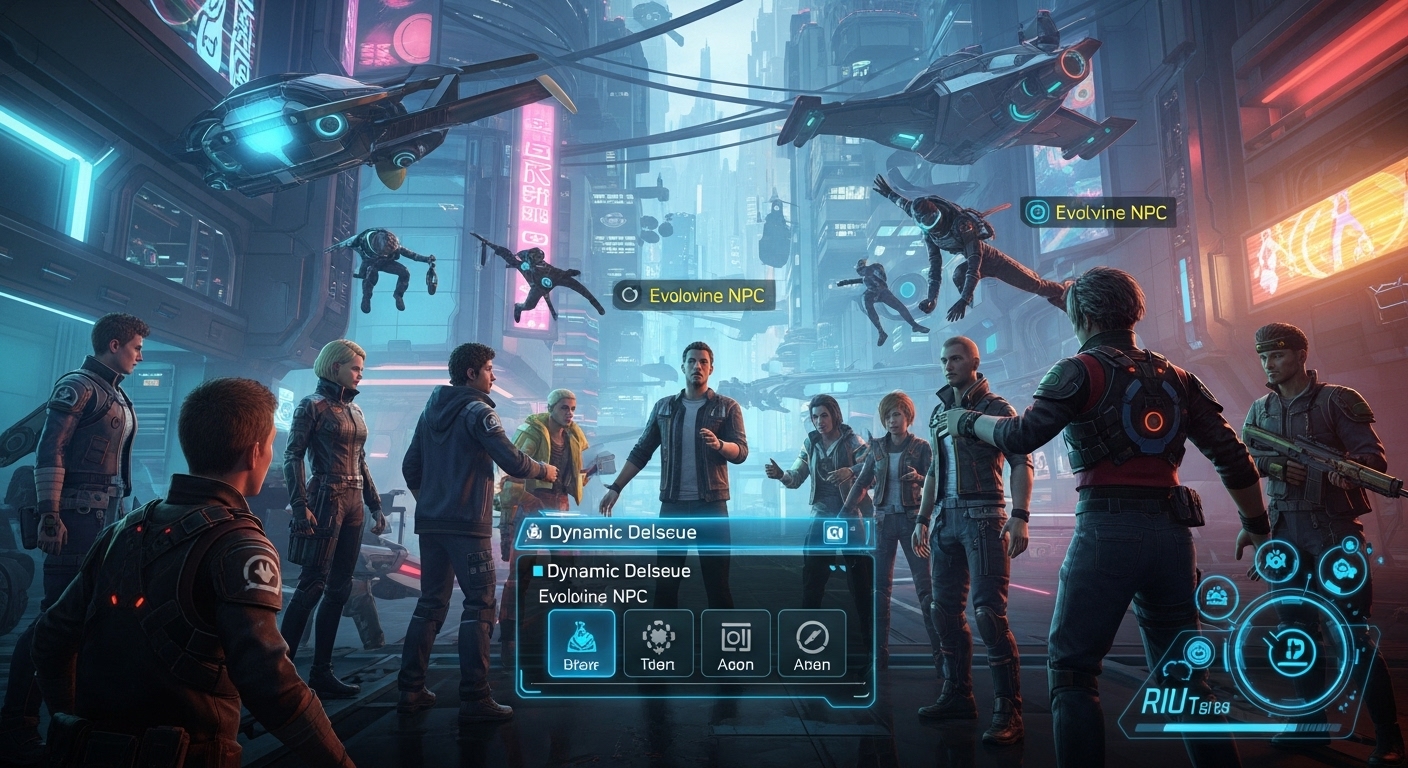Introduction to AI NPCs in Modern Gaming
The gaming industry has always thrived on innovation, pushing boundaries to deliver new experiences to players around the world. Over the past few decades, we have witnessed incredible progress, from 8-bit arcade classics to sprawling open-world adventures. Among the most transformative developments in recent years is the integration of artificial intelligence into non-player characters, commonly known as NPCs. Traditionally, NPCs served as static or scripted elements within a game, designed to deliver dialogue, provide missions, or act as basic adversaries. However, with the rise of advanced AI systems, NPCs are becoming dynamic, adaptive, and capable of interacting with players in ways that feel more authentic and lifelike. This shift is not merely cosmetic; it fundamentally alters how games are played, experienced, and even remembered.
The Evolution of NPCs Over Time
To understand how AI NPCs are revolutionizing gameplay, it is important to look back at their origins. Early NPCs were little more than background fillers or static quest-givers with pre-programmed lines. In classic role-playing games, NPCs often repeated the same phrases endlessly, giving players minimal interaction beyond the functional task of progressing the storyline. As technology advanced, NPCs began to feature more complex dialogue trees, branching storylines, and limited decision-making. Yet, these interactions were still confined to predetermined outcomes. Today, with the rise of machine learning and natural language processing, NPCs are breaking free from these limitations. They can now analyze player behavior, adapt their responses, and even generate unscripted dialogue, creating the sense of a living, breathing world rather than a set of rigidly designed encounters.
The Role of Artificial Intelligence in Gameplay
Artificial intelligence is not just a buzzword in gaming; it has become a core pillar of development. Modern AI algorithms allow NPCs to simulate human-like behaviors, emotions, and decision-making. By leveraging large datasets and real-time computation, developers can design NPCs that respond intelligently to player actions. For example, instead of mindlessly attacking, an enemy NPC might evaluate the environment, coordinate with allies, and adapt to the player’s combat style. Similarly, friendly NPCs can provide meaningful companionship, assist in solving puzzles, and even evolve their personalities throughout the game. The role of AI extends beyond behavior, as it also affects world-building, immersion, and player agency. By making NPCs more unpredictable and reactive, games gain a sense of depth that static design could never achieve.
Enhancing Immersion Through Realistic Interactions
One of the most significant impacts of AI-driven NPCs is the enhancement of immersion. Players are no longer interacting with characters that feel like cardboard cutouts. Instead, they are engaging with entities that appear to think, feel, and respond dynamically. In open-world games, this immersion is particularly powerful, as players can wander into towns or villages and find NPCs going about their daily routines. With AI, these routines are no longer repetitive scripts but adaptive behaviors. A shopkeeper might remember a past interaction, a guard might become suspicious of repeated trespassing, and a companion might express genuine concern when the player takes risks. These layers of realism create a more personal bond between the player and the game world, making every interaction feel unique.
The Impact on Storytelling and Narrative Depth
Storytelling has always been central to great games, and AI NPCs are pushing narratives into uncharted territory. Traditionally, storylines followed a linear or branching format, with limited player influence. AI, however, allows for emergent storytelling, where narratives evolve organically through player interactions. NPCs can remember past choices, hold grudges, or form alliances, all of which can impact the unfolding story in unpredictable ways. Imagine a game where an NPC you helped early on returns later as a powerful ally, or one you betrayed becomes a dangerous foe. These dynamic relationships blur the line between scripted storytelling and player-driven narratives. As a result, every playthrough can be different, offering unparalleled replay value and emotional engagement.
Personalized Gameplay Experiences
No two players approach a game in the exact same way. AI NPCs make it possible to tailor gameplay experiences to individual styles. If a player tends to be aggressive, NPCs might respond with caution, fear, or increased defenses. On the other hand, a diplomatic player might inspire NPCs to engage in cooperative strategies, open secret dialogue paths, or unlock unique story arcs. This personalization ensures that players feel their choices truly matter, giving them ownership of their journey. Developers are now experimenting with NPCs that evolve alongside the player, learning from their habits and adapting accordingly. This results in a game world that feels truly alive, where no two adventures are exactly the same.
AI NPCs and Emotional Engagement
One of the more surprising impacts of AI NPCs is their ability to foster emotional connections. Players have long formed attachments to characters in games, but with AI, these relationships take on greater significance. Companions that react realistically to player decisions create a sense of authenticity that scripted dialogue cannot replicate. When an NPC shows sadness, relief, or loyalty in response to the player’s actions, the emotional weight is far greater. These connections can even extend beyond the game itself, with players remembering moments of companionship, betrayal, or sacrifice long after they put down the controller. AI NPCs transform what could have been a fleeting interaction into a memorable emotional experience.
Challenges in Designing AI NPCs
Despite their potential, creating believable AI NPCs is not without challenges. Designing algorithms that can mimic human-like behavior requires vast amounts of data, careful programming, and extensive testing. Developers must strike a delicate balance between giving NPCs autonomy and maintaining narrative cohesion. Too much unpredictability could disrupt the story, while too little would undermine immersion. There are also concerns about computational demands, as complex AI systems require significant processing power, which can limit their use in certain platforms or games. Additionally, ethical questions arise when NPCs become too lifelike, blurring the line between simulation and reality. Developers must navigate these challenges carefully to ensure that AI NPCs enhance gameplay rather than detract from it.
The Role of Machine Learning and Natural Language Processing
Machine learning and natural language processing play a crucial role in the development of AI NPCs. Through machine learning, NPCs can analyze player data and adjust their strategies over time. This allows enemies to become smarter and allies to become more effective. Natural language processing enables NPCs to engage in meaningful conversations, moving beyond canned responses to generate context-aware dialogue. Some experimental games are already using AI-driven dialogue systems where players can speak naturally, and NPCs respond with realistic, unscripted lines. This opens the door to unprecedented levels of interactivity, making conversations with NPCs feel more like talking to another person rather than reading through a scripted menu of choices.
The Future of Multiplayer and AI NPC Integration
While AI NPCs are transforming single-player experiences, their impact on multiplayer games is equally exciting. In online environments, NPCs can fill roles that human players cannot or do not wish to occupy. For example, they can act as guides, merchants, or opponents that enhance the overall ecosystem of the game. In competitive settings, AI-driven NPCs can ensure balance, stepping in to fill team gaps or maintaining challenge levels. Moreover, developers are exploring the potential for NPCs that evolve not just based on one player’s actions but through the collective behavior of entire communities. This could lead to persistent worlds where NPC societies develop and change in response to the collective actions of players, creating a constantly evolving gaming universe.
How AI NPCs are Redefining Replayability
Replayability has always been a valuable feature in games, but AI NPCs take it to a whole new level. In the past, replay value often depended on alternate endings, optional side quests, or different character builds. With AI, every replay can feel fundamentally different because NPCs do not behave the same way twice. Their adaptability ensures that choices, interactions, and even combat encounters vary across playthroughs. A player who experienced a peaceful resolution in one run might face hostility in another simply because NPCs remembered and reacted differently. This unpredictability extends the lifespan of a game, making it worth revisiting even after multiple completions.
Economic Implications of AI NPCs in Virtual Worlds
AI NPCs are not just changing gameplay; they are also reshaping virtual economies. In online role-playing games and metaverse-like platforms, NPCs often act as vendors, traders, or quest-givers. With AI, these roles can evolve into complex economic systems. NPC merchants might adjust prices based on supply and demand, traders could remember a player’s reputation, and quest rewards might vary depending on the world’s current state. This creates virtual economies that mirror real-world markets, making them more engaging and challenging. Players must think strategically, not just in combat but in commerce and resource management, adding an entirely new dimension to gameplay.
Ethical and Social Implications of AI NPCs
As AI NPCs become more lifelike, ethical questions emerge about how they should be treated. While they are not conscious beings, the realism of their behavior can cause players to empathize or even feel guilt over their actions. Developers must consider the psychological impact of creating NPCs that blur the line between fiction and reality. Additionally, there is the risk of reinforcing harmful stereotypes if AI NPCs are not designed thoughtfully. The social implications extend beyond gaming, as AI NPCs may serve as a testing ground for broader AI-human interactions in society. How players choose to treat lifelike NPCs could influence attitudes toward real-world AI systems in the future.
The Potential for Cross-Media Integration
The rise of AI NPCs also opens the door for cross-media integration. Characters from games could potentially carry over into films, virtual reality, or even augmented reality experiences. Imagine an NPC that remembers interactions from a video game and continues the relationship in a VR simulation or mobile app. This type of persistent character could create transmedia storytelling experiences unlike anything seen before. By connecting across platforms, AI NPCs could become long-term companions for players, extending their influence beyond the boundaries of a single game.
The Future of AI NPCs in Gaming
Looking ahead, the possibilities for AI NPCs are nearly limitless. As technology continues to evolve, NPCs will become more sophisticated, believable, and integral to gameplay. Future NPCs may possess advanced memory systems, nuanced emotional intelligence, and the ability to interact with multiple players simultaneously in meaningful ways. They might even generate entire storylines dynamically, making each gaming experience unique to the individual. However, the industry must approach these developments with caution, ensuring that technological progress does not overshadow ethical considerations or narrative coherence. What is clear is that AI NPCs are not just a passing trend; they represent a new era of interactive entertainment.
Conclusion
AI NPCs are fundamentally changing the way players experience games. From enhancing immersion and storytelling to personalizing gameplay and shaping virtual economies, their impact is profound and far-reaching. By making characters feel more alive, responsive, and emotionally engaging, AI is blurring the lines between fiction and reality, offering players experiences that are both entertaining and meaningful. While challenges remain in terms of design, ethics, and technological limitations, the potential of AI NPCs is undeniable. As developers continue to innovate, the future of gaming promises worlds populated not by static characters but by intelligent beings capable of surprising, delighting, and challenging players in ways we are only beginning to imagine.


